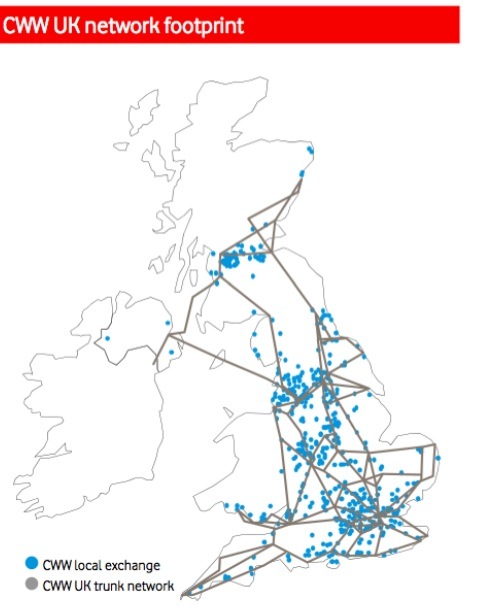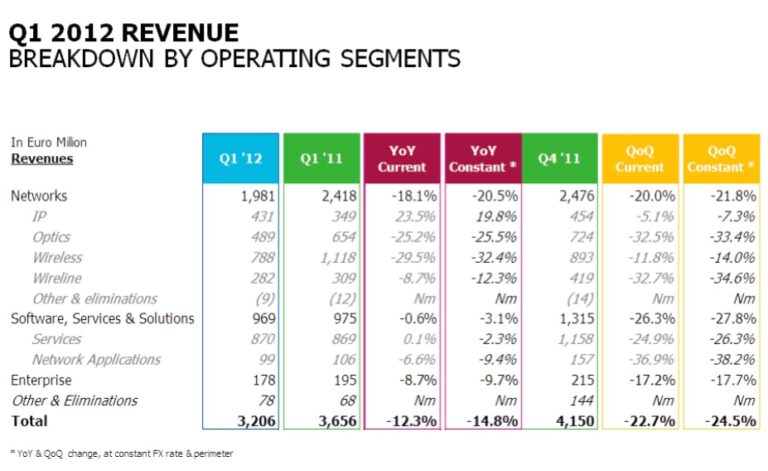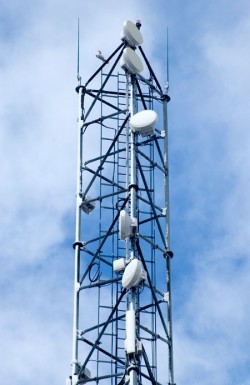Some further thoughts on the C&W take over
Vodafone's proposed acquisition of Cable and Wireless Worldwide would give it direct ownership of a fibre network that runs within 100 metres of about 30% of its UK base stations. With Vodafone currently leasing much of its backhaul network, much of it from BT, the operator is attracted by the prospect of turning off, or reducing to a trickly, an ongoing operational expense that is only likely to increase in line with bandwidth demand.
A Vodafone executive said that the operator's preferred option would be to link base stations within 100m directly to the core network through fibre, rather than microwave. So that throws up the possibility of Vodafone having up to 30% of its base stations connected by fibre, directly to C&W's (soon to be Vodafone's) core network.
There's a couple of interesting aspects to this. The first is that C&W already has some wholsale mobile backhaul contracts with other operators. Vodafone has advised us that it knows this to be the case, and it was confirmed for us by C&W. Neither party wants to divulge how many contracts there are and who they are with, as this is treated in commercial confidence.
But what that means is that when Vodafone does the deal it will be taking over backhaul contracts for, say, O2 or EE, effectively becoming a wholesale provider to its competitors. Vodafone said to us that it would appraise all contracts when it completes its takeover, scheduled for the autumn. But in principal it wants to continue the backhaul wholesale business, if possible.
A second item to consider is that Vodafone shares many of its sites, and much of the infrastructure at those sites, with O2. Through their Cornerstone partnership the operators jointly order and manage the passive elements of their networks – ie towers, antennas, power, cooling etc. They have been consolidating their sites since the partnership was founded in 2009. Last autumn, we reported that the operators were ordering at least 60 new masts a month for joint use, for instance.
 So far, the Cornerstone partnership doesn't extend to active elements, or to backhaul. But if 30% of Vodafone's sites are to sit on the end of nice fat fibre connections wouldn't it make sense for O2 to somehow benefit from that, given it now shares so many base station sites with Vodafone? Again, a Vodafone spokesperson confirmed that the operator would like to see O2 benefit from the increased capacity, and said the operator would "hope O2 might want to use it". In other words, we could see O2 and Vodafone sharing the same physical infrastructure for backhaul, with the infrastructure owned by Vodafone. As O2 would presumably be paying for the privilege, it would help Vodafone offset some of the costs of deployment, of course.
So far, the Cornerstone partnership doesn't extend to active elements, or to backhaul. But if 30% of Vodafone's sites are to sit on the end of nice fat fibre connections wouldn't it make sense for O2 to somehow benefit from that, given it now shares so many base station sites with Vodafone? Again, a Vodafone spokesperson confirmed that the operator would like to see O2 benefit from the increased capacity, and said the operator would "hope O2 might want to use it". In other words, we could see O2 and Vodafone sharing the same physical infrastructure for backhaul, with the infrastructure owned by Vodafone. As O2 would presumably be paying for the privilege, it would help Vodafone offset some of the costs of deployment, of course.
Vittorio Coloa, on a media briefing call, said that the growing demand for bandwidth meant that all l operators will have to sweat assets, passive and active, and that "there will be increased sharing" as a result of that. It's too early for details, he said, but it certainly seems like Vodafone has thought through the increased sharing opportunities the C&W network could give it.
A third aspect of this is Vodafone's relationship with BT. Vodafone is currently a customer for BT's access links, of course, and that is likely to continue, especially for sites that are not near C&W's network. Vodafone is also a provider of services back to BT, acting as host operator for BT's enterprise-focussed MVNO. But muddying those commercial waters will be Vodafone's direct entry as a competitor to BT in the enterprise communications market, providing services across fixed and mobile networks. As BT's MVNO host it would then be providing mobile airtime and data connectivity to one of its key enterprise competitors. Of course, it competes already with BT at the mobile level, but this ability to provide in-house Unified Comms across its fixed and mobile assets is new, and puts it directly in BT's way. No wonder Colao said his first call today, once he was done with the analysts, would be to BT.







 So far, the Cornerstone partnership doesn't extend to active elements, or to backhaul. But if 30% of Vodafone's sites are to sit on the end of nice fat fibre connections wouldn't it make sense for O2 to somehow benefit from that, given it now shares so many base station sites with Vodafone? Again, a Vodafone spokesperson confirmed that the operator would like to see O2 benefit from the increased capacity, and said the operator would "hope O2 might want to use it". In other words, we could see O2 and Vodafone sharing the same physical infrastructure for backhaul, with the infrastructure owned by Vodafone. As O2 would presumably be paying for the privilege, it would help Vodafone offset some of the costs of deployment, of course.
So far, the Cornerstone partnership doesn't extend to active elements, or to backhaul. But if 30% of Vodafone's sites are to sit on the end of nice fat fibre connections wouldn't it make sense for O2 to somehow benefit from that, given it now shares so many base station sites with Vodafone? Again, a Vodafone spokesperson confirmed that the operator would like to see O2 benefit from the increased capacity, and said the operator would "hope O2 might want to use it". In other words, we could see O2 and Vodafone sharing the same physical infrastructure for backhaul, with the infrastructure owned by Vodafone. As O2 would presumably be paying for the privilege, it would help Vodafone offset some of the costs of deployment, of course.